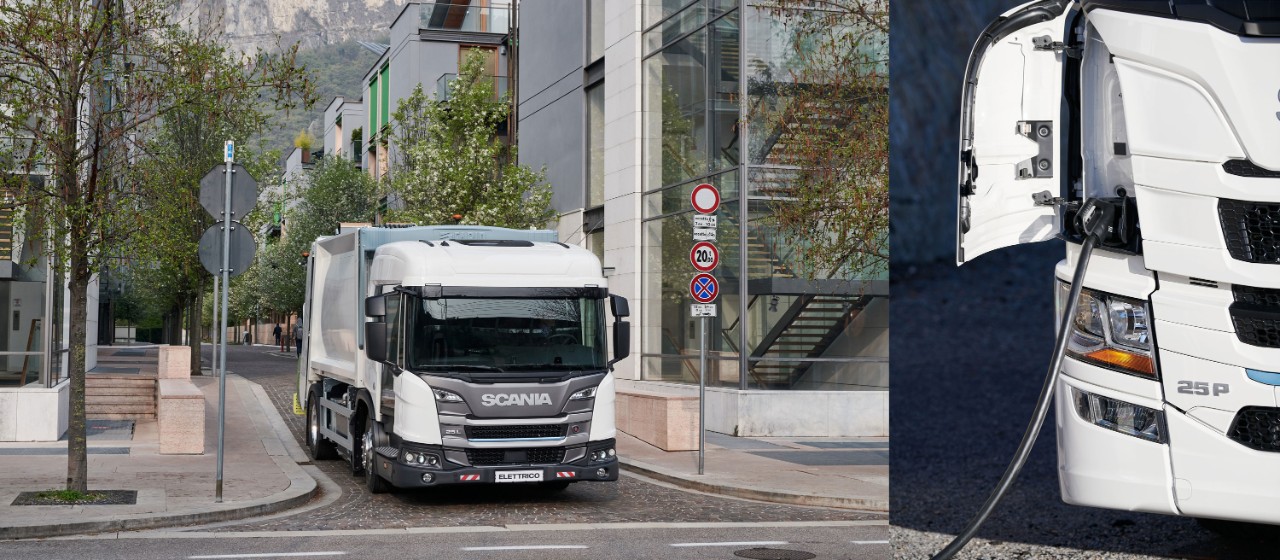
Innovative collaboration with leading start-ups
26 MAY 2022
Scania is working on three new Combient Foundry start-up projects to gain vital insights, and to accelerate our customers’ electrification journeys.
Scania has long said it cannot achieve the shift towards sustainable transport by itself. The company values cross-industry partnerships, combining Scania’s expertise with others in the ecosystem to go further, faster.
One such example is its involvement in Combient Foundry, a Nordic-based venture client initiative that aims to connect business opportunities within large industrial companies with globally selected and fast-growing start-ups, for potential business collaboration. First in joint pilots, then potentially in supplier or partner relationships.
“Combient Foundry can leverage the best innovation and drive in the global start-up scene, combined with the knowledge, resources and market reach of the multinational, large corporates. In Scania’s case, we also have the benefits of start-up funding from Sweden’s national innovation agency Vinnova,” says Magnus Lundin, Head of Strategic Venture Collaboration, Scania.
“Today, a lot of innovation reaches market through start-ups, whether it’s new technology or new business models. These start-ups, or scale-ups as they are called when growth is taking off, are often fuelled by venture capital and scaling in collaboration with strategic partners and customers.”
Scania is now working on three such projects for preparing trucking companies and fleet owners for the transition to electrification. The projects, chosen from a rigorous selection process during Q4 of 2021, are partly funded by Vinnova. In keeping with Combient Foundry’s accelerated approach, testing runs up until the summer holidays, with results due later in the year.
“The time frame for these projects is short, simply because the timetable for electrification will be much quicker than people think, even in the heavy vehicle sector. Industry-wide, it’s a phenomenon whose time has come,” says Erik Bråvander, Scania project manager for all three of these initiatives.
Scania and Spark EV Technology
The issue of ‘range anxiety’ is commonly recognised as a stumbling block to the transport system achieving full electrification. There is not yet the charging infrastructure or sufficient battery power to allow battery-electric vehicles (BEVs) to operate for long distances – something of particular concern for Scania’s haulage industry customers.
Scania is working with UK-based start-up Spark EV Technology, which has developed a machine-learning model for energy and range prediction. It can accurately calculate how much energy a vehicle will use to complete a certain route, or how far a vehicle can travel in any direction based on its circumstances.
“Range accuracy, vehicle specification and an effective charging strategy can have a significant impact on the commercial viability of a transition to a BEV fleet. We are harnessing machine learning to bring essential insights to drivers and fleet operators,” says Richard Welford, Chief Commercial Officer of Spark EV Technology.
“It’s a sophisticated model that takes a lot of different data points and perspectives into consideration,” adds Erik Bråvander. “Such as how the vehicle and driver are behaving, traffic conditions, the topography of the route and the impact of the weather.”
Scania and Autofleet
Israeli company Autofleet helps asset-heavy fleets such as delivery & logistics fleets, taxi fleets and ride-sharing services optimise the usage of their vehicles. When it comes to electrification Autofleet’s platform is being used by fleets to plan their transition to electric vehicles and optimise vehicle routing and charging in live operations.
“As part of this project, Autofleet has access to historical, real-life data from a combustion engine fleet of a Scania customer, and using Autofleet’s platform, we are able to understand the impact of electrifying these heavy vehicles on the operation and make data-driven decisions on the optimal electrification plan for the fleet,” explains Erik Bråvander.
The goal is that this will help Scania’s customers see which vehicles and routes could be electrified, and where there are advantages in using a Scania BEV vehicle.
“We are excited to partner with Scania on this project, leveraging Autofleet’s optimisation platform, Fleet Planning Simulator and our team’s experience, this time in the context of heavy vehicle fleets and their path to electrification,” says Kobi Eisenberg, Autofleet’s CEO and Co-founder.
Scania and ev.energy
By providing smart charging services to EV drivers in partnership with OEMs, charger manufacturers and energy utilities. In this project their data modelling team are looking at the optimisation of charging and charging infrastructure placement, both in terms of charging depots and public charging facilities.
“ev.energy also has access to the same customer data,” says Bråvander, “but its model looks at driving patterns and tries to help Scania figure out where the best places would be for installing new charging hardware and perform charging in the smartest way possible.”
“We’re delighted to be supporting Scania and their customers with the transition to electrification,” adds William Goldsmith, Head of Grid & Data Services at ev.energy. “Applying our established expertise in domestic EV charging to commercial fleets is an exciting opportunity.”
A catalyst for sustainable transport
“Combient Foundry helps quicken the time to market of new innovations and means companies can work together to help our customers shape their electrification strategies.” says Erik Bråvander.
“Ultimately, it can be a catalyst to the transition that Scania and the transport industry must make to achieve a sustainable transport system.”